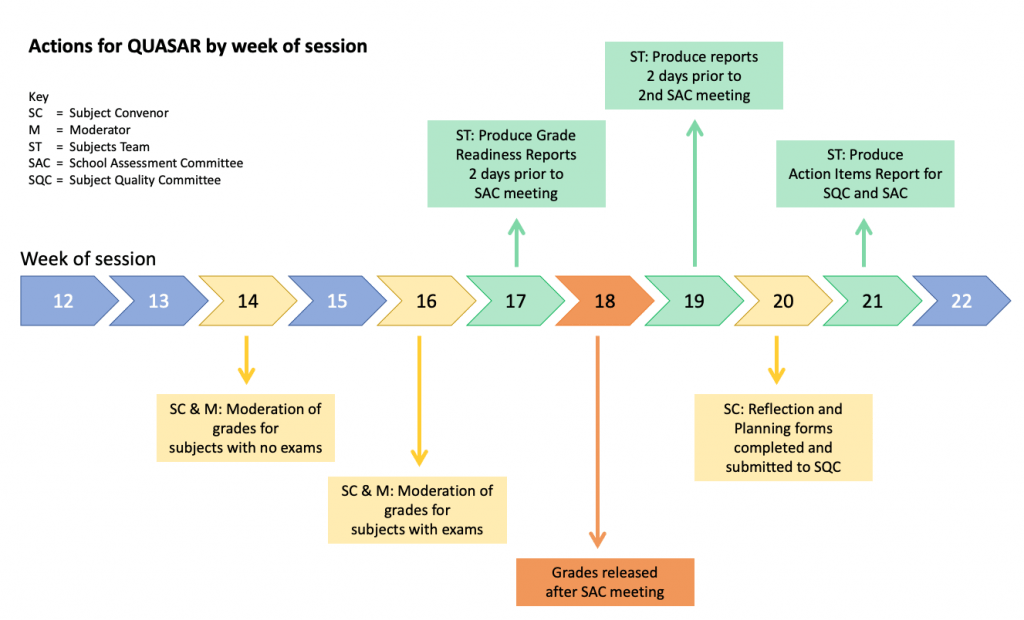Moderation is a process for checking and reviewing our assessment processes to ensure the quality of our learning, teaching and assessment. It's about making sure our assessment practices are valid, reliable, fair and consistent, not only for students but also staff and external stakeholders.
Assessment should always involve our professional judgment, and moderation helps us feel confident that our judgments align with Charles Sturt policies, external or accrediting standards and with our peers in our course or discipline teams.
The Assessment - Conduct of Coursework Assessment and Examinations Procedure states requirements for moderation of assessment in each delivery of each subject.
Steps in moderation
- QA of assessment in the outline is carried out in the Subject Outline Tool through QA Declarations as you design and develop your assessments and is no longer recorded in the Online Moderation System or QUASAR.
- Moderation and Grades forms are completed throughout the session as assessment is implemented, marked and graded. Reviewing during the marking process is especially important with criterion-referenced standards-based assessment to ensure consistency and quality as you mark. The grades are recommended to the School Assessment Committee.
- Reflection and Planning forms are completed when you review and evaluate your assessment processes to identify areas for improvement and provide a record of the moderation process to the School Assessment Committee.
Timelines and workflow

Summary
- Week 14: Subject Convenor and Moderation - Moderation of grades for subjects with no exams.
- Week 16: Subject Convenor and Moderation - Moderation of grades for subjects with exams.
- Week 17: Subjects Team - Produce Grade Readiness Reports 2 days prior to SAC meeting.
- Week 18: Grades released after SAC meeting.
- Week 19: Subjects Team - Produce reports 2 days prior to second SAC meeting.
- Week 20: Subject Convenor - Reflection and Planning forms completed and submitted to the Subject Quality Committee.
- Week 21: Produce Action Items Report for the Subject Quality Committee and School Assessment Committee.
Good practice
Below are some good practices to consider when moderating and reflecting on assessment.
Moderating
- Develop marking criteria and standards collegially as a team where possible with all subject markers so they are all conversant with the requirements.
- Have a meeting prior to marking to ensure that all markers have the same understanding of the marking standards agreed on and presented to the students, and have another meeting after marking to ensure consistency.
- Develop standards that are objective in nature so that subjective terms which can be interpreted differently by both students and markers are not used.
- Moderate across the range of all grades to ensure consistency.
- Check extremes of marking to ensure consistency.
- Find a moderator if you are a single marker to check your own marking.
- Use moderation methods suitable for your subject and the type of assessment and number of markers (see check boxes in the QUASAR moderation document).
Reflecting
- Write a note as a moderator in QUASAR to send to the convenor and/or the School Assessment Committee to help the convenor with their reflection in the Reflection and Planning form; provide information about any issues and positives to inform the committee about any actions that are needed.
- As a convenor check the Moderation and Grades form to read any notes to reflect on in the Reflection and Planning.
- Record your practices in the Quality Assurance and Reflection System to maintain information about moderation and its results.
